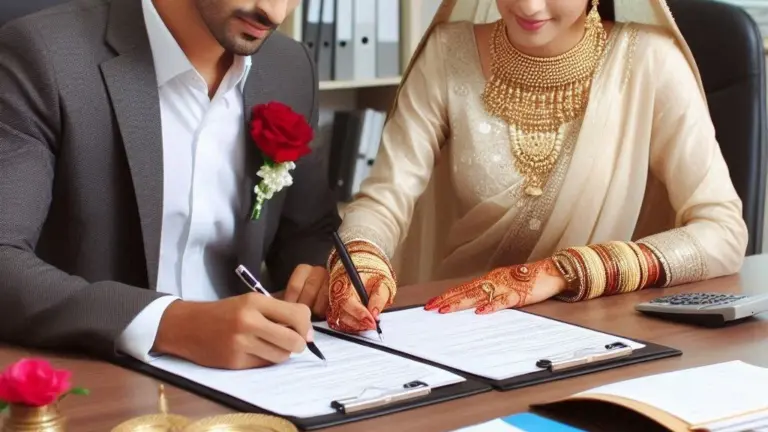
Is Court Marriage Legal in Islam? A Complete Islamic & Legal Guide
Is Court Marriage Legal in Islam? A Complete Islamic & Legal Guide
Many Muslim couples today want to know one thing: is court marriage legal in Islam? The answer depends on how the marriage is performed and whether it meets the Islamic conditions of a valid Nikah.
In Pakistan court marriage is typical particularly for couples who would rather have a private ceremony or who must deal with family constraints. But before going down this route its crucial to know what Islam says about it, how court marriage registration operates and whether Sharia law is followed.
Understanding Court Marriage in Islam
A court marriage is a legally sanctioned union consummated and recorded frequently before a judge or other designated Nikah Khawan. This procedure enables two adults to legally wed in Pakistan without a big ceremony or the involvement of family members.
In Islam, marriage (Nikah) is a sacred contract between a man and a woman. It becomes valid when the following Islamic conditions are fulfilled:
- Consent of both bride and groom
- Presence of two Muslim witnesses
- Mention of Mahr (dower)
- Proper Ijab (offer) and Qabool (acceptance)
The Nikah is legitimate whether it takes place in a courtroom, a mosque or a person’s home as long as these requirements are fulfilled. Because of this court marriage in Islam is permitted as long as it complies with Sharia law and has these components.
Many scholars concur that, provided all Islamic requirements are met, a Nikah performed in court is legitimate in Islam. What counts are the witnesses, the intention, and the consent, not the location..
Nikah vs Court Marriage
To understand nikah vs court marriage, think of it this way:
- Nikah is the religious form of marriage under Islamic law.
- Court marriage is the legal registration of that Nikah under the country’s law.
Both can go hand in hand. When you perform Nikah and register it with the court, you are following both Islamic and legal obligations.
Many couples in Pakistan do both together; they perform Nikah through a registered Nikah Khawan and then complete court marriage registration for legal protection. This approach is recommended for all couples, especially overseas Pakistanis.
Is Court Marriage Halal or Haram?
The question is court marriage is halal or haram, depending on how it is conducted.
An Islamic marriage is deemed halal and legitimate if it satisfies the aforementioned requirements. But under Islamic law it might not be accepted if it omits important components like witnesses or guardian consent where necessary.
In Islam, for instance, covert marriages without witnesses are forbidden. Islamic teachings are also violated if a couple conceals their marriage to mislead others.
However, a court marriage in Islam is deemed lawful and halal if two adults get married with their consent, the presence of appropriate witnesses, and a Nikah Khawan who performs the Islamic ceremony.
Islamic View on Court Marriage
The Islamic view on court marriage is based on the principle that marriage is a public contract, not a secret relationship. Islam encourages transparency and legal recognition.
In the time of the Prophet (ﷺ), marriages were announced publicly so that society recognized the relationship. Court registration today serves the same purpose it gives the marriage legal proof and social recognition.
Thus, by completing a court marriage in Karachi, you are safeguarding your Islamic rights while also abiding by national law. In areas like inheritance paperwork and legal protection, it benefits both the husband and the wife.

Court Marriage Registration in Pakistan
In Pakistan, court marriage registration is a legal process that records your Nikah officially. It is usually handled by a registered Nikah Khawan or lawyer who ensures all paperwork and witnesses are arranged properly.
The process includes:
- CNIC copies of bride and groom
- CNIC copies of witnesses
- Passport-size photos
- Proof of residence
After the Nikah ceremony, the Nikah Nama is signed and submitted for court marriage registration. Once approved, you receive a legal marriage certificate, which can be further processed for a computerized NADRA certificate.
After the Nikah ceremony, the Nikah Nama is signed and submitted for court marriage registration. Once approved, you receive a legal marriage certificate, which can be further processed for a Nadra computerized marriage certificate.
Islamic Marriage Laws in Pakistan
Islamic marriage laws in Pakistan combine both Sharia and legal principles. A valid marriage under Pakistani law must also be valid under Islamic law.
The Nikah Nama used in Pakistan adheres to the Islamic format, which includes consent witnesses and Mahr details. The court marriage procedure in Islamabad merely guarantees that your Nikah is entered into the government database, allowing it to be utilized for inheritance property and visa-related legal purposes.
So if the Nikah is performed in accordance with Sharia, a legal marriage in Islam and a legal marriage under Pakistani law can coexist harmoniously.
Sharia Law and Court Marriage
Many people worry that sharia law and court marriage in Rawalpindi may conflict, but they actually support each other. Sharia emphasizes public recognition of marriage, fairness, and documentation.
Court registration is simply a modern way to meet those goals. It prevents fraud, protects women’s rights, and helps maintain family records.
If the Nikah is performed correctly, court marriage in Islam does not violate Sharia. It becomes both an Islamic and legal marriage fulfilling religious and civil obligations.
Islamic Requirements for Nikah
Every valid Nikah must have:
- Proposal and acceptance (Ijab and Qabool)
- Two adult Muslim witnesses
- Mahr (dower) decided by mutual agreement
- Consent of both parties
If these are fulfilled, the Nikah is valid whether performed in court, mosque, or home. Islamic requirements for nikah focus on intention, consent, and witnesses, not on the venue.
So, a Nikah performed in a courtroom under these conditions is 100% Islamic.
Civil Marriage in Islam
A civil marriage is simply a marriage recognized by the government. Some couples worry about whether civil marriage in Islam is valid.
If it fulfills Islamic conditions such as mutual consent and witnesses it is valid in Islam. The legal documentation is just an added layer of protection.
In countries like Pakistan, combining both Nikah and civil registration ensures your marriage is valid under both laws. This is especially important for overseas Pakistanis who need legal proof of marriage abroad.
Islamic Marriage Validity
The Islamic marriage validity depends on Sharia, not the setting. If you perform the Nikah in a court, mosque, or home, the place does not change its validity. What matters are the elements of a proper Nikah: witnesses, consent, and Mahr.
So, if your court marriage is done through a registered Nikah Khawan and meets these conditions, it is both valid and halal in Islam.
Common Misunderstandings About Court Marriage
Some people believe court marriage is against religion. This is not true. Islam never forbids where the marriage takes place; it only defines how it takes place.
A few myths need clearing:
- “Court marriage is not Islamic.” False. The setting does not affect validity.
- “It must be done by family elders.” Not required. Only consent and witnesses are mandatory.
- “Court marriage is secret.” It should not be. Public announcement or registration is encouraged in Islam.
So, a court marriage performed with transparency and proper Islamic conditions is fully valid.
Why Many Couples Choose Court Marriage
In Pakistan, more couples are choosing court marriage for several reasons:
- Privacy and convenience
- Protection of legal rights
- Family disagreements or different sects
- Quick processing for visa or documentation
When you follow the correct process, court marriage registration ensures that your marriage is recognized both legally and religiously.
It helps you obtain official documents, such as the NADRA marriage certificate, which is necessary for various legal and overseas purposes.
Conclusion
Frequently Asked Questions
1. Is court marriage allowed in Islam? Yes. Court marriage is allowed in Islam if it fulfills Shariah requirements such as mutual consent, presence of witnesses, Mahr, and proper Ijab-o-Qabool. The venue does not affect the validity of the Nikah.
2. Is court marriage legally valid in Pakistan?
Yes. Court marriage in Pakistan is legally recognized when the Nikah is registered with a court or a registered Nikah Khawan. Once completed, it is valid for legal documentation, inheritance, and visa purposes.3. What is the difference between court marriage and traditional Nikah?
Traditional Nikah is a religious ceremony, while court marriage is a legal registration process. Both can coexist if Islamic requirements are fulfilled and the marriage is registered legally in Pakistan.4. Can court marriage be considered a valid Nikah?
Yes. If all Islamic conditions are met consent, witnesses, and Mahr court marriage is considered a valid Nikah in Islam.5. Why is court marriage beneficial in Pakistan?
It provides legal protection, inheritance rights, visa documentation, and ensures compliance with both Islamic principles and Pakistani law, making it ideal for privacy-conscious couples or overseas Pakistanis.6. What documents are required for court marriage in Pakistan?
CNICs of the bride, groom, and witnesses, passport-size photos, proof of residence, and a completed Nikah Nama are required for court registration and NADRA certificate.
